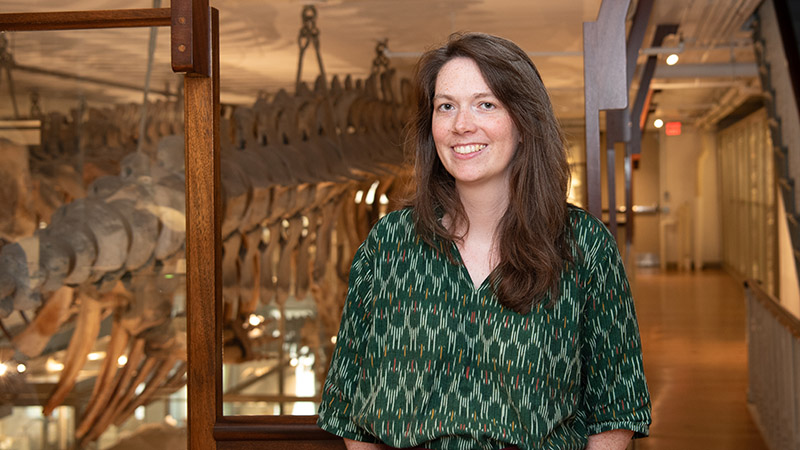I study how mammalian nervous systems evolved to generate complex movements like hand dexterity. I compare deer mice (the mice that are native to North America) from forests, which are good climbers and very dexterous, to those from prairies, which are not as good at climbing. I’ve found that the forest mice have a larger number of a specific type of neuron in their cortex. This is exciting because we think that evolutionary expansion of the cortex is important for humans’ skilled movement, like dexterous tool use, but we don’t really understand what having more neurons does for the brain. Our discovery about brain differences in the dexterous mice gives us a starting point for answering that question!
Photo by Celia Muto.
What are the big questions driving your research?
How does genetic and molecular variation, either through evolution or within a species, result in neural and behavioral variation? How many different ways can you evolve a similar behavior? How do our nervous systems generate dexterous movement?
What drew you to this area of neuroscience?
Since I was an undergrad, I’ve been interested in molecular and cellular neuroscience. My graduate dissertation was about the genes that turn on in neurons when they’re activated and how those genes translate neurons’ electrical signals into molecular or cellular outcomes – like making stronger connections to form memories. When I started my postdoc, I wanted to find an experimental system where I could link molecular understanding to behavior, because after all, the ultimate purpose of the nervous system is to generate behavior. I therefore turned to an evolutionary approach: evolution happens through changes in genes, so at the molecular level. This makes it possible to start with a behavioral difference, figure out the neural difference, and then the molecular and genetic difference—allowing me to make links across functional levels of understanding (from genes to molecules to neurons to behavior).
What is the trait you most admire in others?
I admire when others care not only about their work itself, but also about their scientific community. Most people I meet here at Harvard are smart, have interesting ideas, and are doing cool science, but the pressures of the academic system can make us hide ourselves away in our labs, or worst case, breed competitiveness, harassment, and other negative social outcomes. We must resist this by supporting one another and actively working to make our work community healthy! I hear all too often of people struggling not because the science is hard (which it often is!), but because of other negative pressures like bullying or financial hardship. Our science is better when we support each other as scientists by sharing ideas and expertise. We can also support each other as humans by making this fun and rewarding career path accessible to anyone who wants to pursue it! I am extremely grateful to those who take the time to support others through mentoring, organizing, and advocating – and I’m especially grateful to those who have helped me in these ways. I hope to be able to pass it forward.
What is an emerging area of science that you are excited about? Where you see potential for big discoveries in the next decade?
I’m very excited about emerging technologies that are allowing us to do experiments in animals outside of our usual model systems (e.g., lab mice, Drosophila melanogaster, C. elegans). We’ve learned a lot from traditional model systems, and I’m sure we will continue to. However, I think being able to do modern neuroscience and molecular experiments in non-model systems has the potential to expand the questions we can ask, especially about brain evolution and behaviors that are hard or impossible to study in traditional systems, and it will facilitate new discoveries that we wouldn’t make otherwise.
What are your hobbies outside of the lab—current, past, or future?
A few years ago, I challenged myself to try to not buy any new clothes. I now spend a lot of time outside of lab making or upcycling clothes and creatively (or not) mending the clothes I have. I also like biking, singing, hanging out with my dog ChaCha, and contributing to our new(ish) union that represents postdocs, researchers, and non-tenure-track faculty: Harvard Academic Workers!

